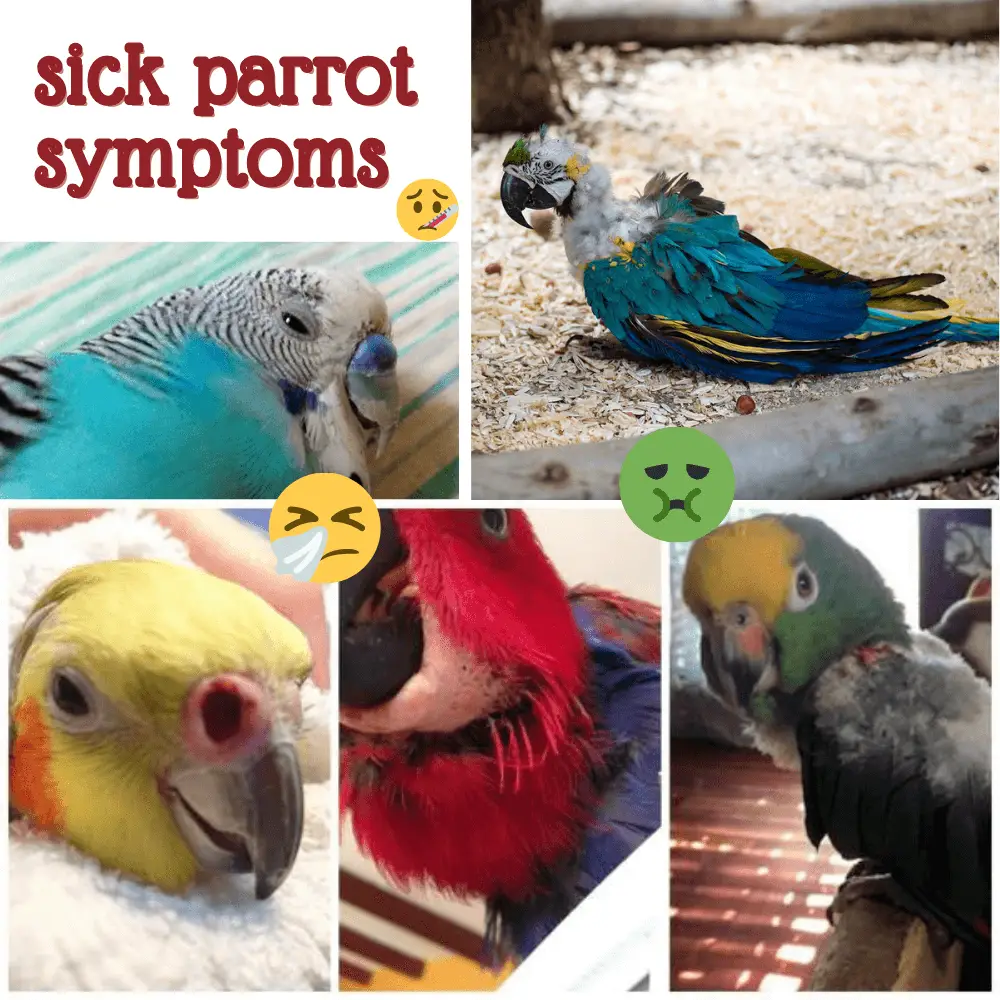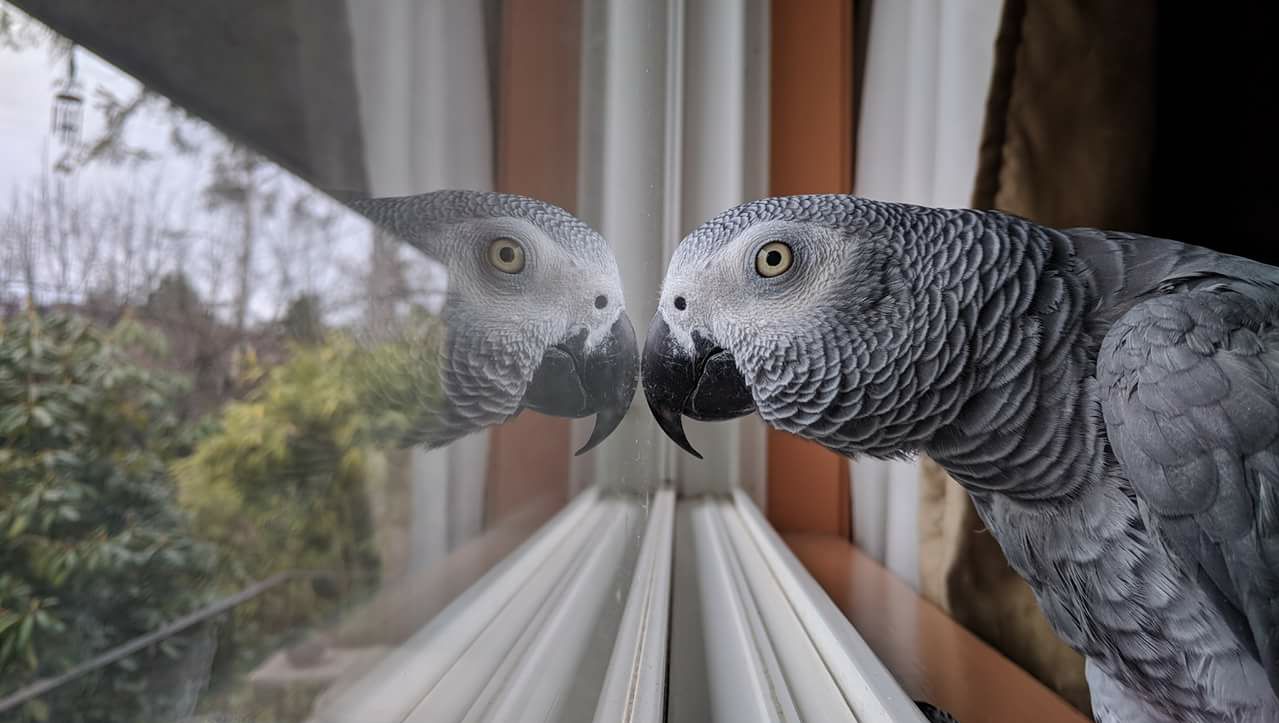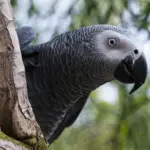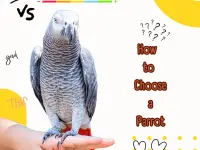
Sick parrot symptoms: Parrots are masters in the art of physiological masquerade, that is to say, the camouflage of a disease or its incubation.
They can therefore very easily transmit a virus or a fatal bacteria without, however, appearing to be affected by them.
They are called resistant carriers.
When adopting a new bird, I cannot stress enough the importance of screening tests ( viruses and bacteria ) and the quarantine period, during which neither the air nor your clothes or other equipment should come in contact. with one or more birds already in your house.
During the quarantine period, it is important to wash your hands well and change your clothes and shoes before approaching or touching a healthy parrot.
Even with a careful veterinary examination, it is possible that one or more pathogens may not be obvious or not present until after the parrot’s transition period into its new home.
This is why several specialists agree in affirming that it is preferable to wait at least 6 months or more after the arrival of the last parrot before acquiring another bird.
The best time to prevent the spread of disease is now. If the disease is detected and the bird is treated promptly, there will obviously be less damage to be repaired.
In the parrot, the gregarious instinct combined with its condition of prey dictates to the bird to camouflage any pathology, it will draw on all its energy reserves to have a normal appearance, normal attitudes, and actions so as to hide everything. sign of distress even going so far as to vocalize to camouflage his poor state.
When you realize that something is wrong with your parrot, it is often too late for the poor animal. Treatment can be difficult and often unnecessary.
Hence the importance of having your parrot pass a battery of tests to detect viruses or bacteria upon acquisition. This is still the best that has been found for detecting disease in parrots.
The vet will not only do a visual physical examination, this kind of examination does not give him the necessary tools to confirm whether the bird is healthy or not. the veterinarian will look under the surface through laboratory tests and can thus quickly detect enemies.
The TNO (New Bird Test) could become the most important moment in your parrot’s life if your parrot saves it!
If your bird has not yet passed through the hands of a veterinarian, today is not too late, regardless of the species of bird. I include in the term bird all those who are not part of the Psittacidae family, such as finches, canaries, turtledoves, etc.
All of them can be carriers of disease. you wouldn’t be very proud of yourself if you found out that your magnificent macaw has been infected with a deadly virus by your last little finch.
The problem with parrots is that the signs of affection or illness are very subtle and often take us by surprise. It is not that there are no signs at all, but that these symptoms are not always obvious to recognize.
These signs are all the more difficult to perceive in a new bird that one does not know how to recognize, which in him is normal behavior since it is the bird itself that we do not know!
It is important to observe your parrot well in order to properly identify its normal behaviors, body language, and habits. You will then be more empowered to see and react if there is a change.
You probably won’t know what the nature of the problem is, but at the very least you can give your vet some good pointers who can find and take care of the problem.
Signs to recognize a sick parrot

African grey parrot sick symptoms
- Appetite: a change in the parrot’s appetite ( eats less or on the contrary, eats excessively ). Ditto for water, if the bird seems to you to be drinking excessively. A parrot’s rapid metabolism can become its worst enemy if it eats less or more at all. Birds cannot be deprived of food, even for a short period of time, without experiencing disastrous effects. If you notice a change in your parrot’s appetite, something’s probably wrong.
- Droppings: Any change in total volume, droppings, texture, the color that is not due to feeding is a serious warning sign ( if your bird has eaten beets or colored feed, do not panic, this is quite normal ). In some cases, you can see blood in the droppings.
- Activity: decrease in activity or noise volume (talking/yelling). The parrot sleeps a lot, plays less or not at all, and does not speak. The bird seems less tolerant of effort and gets tired quickly.
- Appearance: puffy feathers ( even if it is comfortable in the room ), tousled, low or hanging wings, half-closed eyes, perched on its 2 legs on its branch or at the bottom of the cage are all signs of very serious problems.
- Breathing: fast, noisy ( not to be confused with the “asthmatic” breaths of the pionus when it is exciting), change of voice, the bird seems out of breath, the tail “pumps” up and down, this movement of the tail is associated with the effort to breathe ( sometimes difficult to notice in short-tailed species ).
- Regurgitation/vomiting: vomiting is always worrying ( not to be confused with emotional regurgitation ). Normally a parrot regurgitates by bobbing its head back and forth, and this is probably a sign of attachment or sexual display. The parrot vomits by moving its head from side to side as a viscous and sticky liquid escapes horizontally from its beak, this bird is in distress and needs help.
- Balance: The parrot seems to lose its balance and has difficulty perching or walking.
- Personality: change in the personality and attitudes of the parrot. A friendly, relational bird that suddenly turns aggressive for no apparent reason or a generally unfriendly parrot that becomes clingy and seeks physical contact or allows itself to be petted.
- Sneezing, coughing, and runny nose.
- Stained feathers above and around the nostrils as well as on the parrot’s head.
- Soiled feathers around the cesspool.
- Diarrhea, polyuria.
- Abnormal weight loss.
- Abnormal lumps or bumps on the body.
- Bleeding.
Each new bird should pass a full medical examination, especially if there are other parrots in the house. There are now too many polyomas, reovirus, and beak and feather disease to ignore this simple but very serious warning!
Parrot Contamination
Several viruses and bacteria are spread by being propelled from the body of the infected bird only by vaporization ( sneezing, or simply when the bird exhales ). These viruses and bacteria are then inhaled, or ingested in infected food, by other healthy parrots.
Diseases can also spread if a healthy bird walks on a perch or eats food infected with the droppings of an infected or sick bird.
Inhalation and ingestion are the most common routes of infection.
Remember that you can also be the vectors of these diseases. The simple fact of walking in a place where there are other birds ( pet store, birdhouse, etc.) may cause you to bring home any pathogen.
The latter can fit on your clothes, shoes, or handbag. It is even more dangerous if you have handled or petted a parrot in one of these places. As I explained a little earlier, parrots hide their illnesses or can be asymptomatic carriers.
Therefore, the quality of the breeder or the animal facility is not questioned here. Even the cleanest and best-maintained farm or animal facility may unwittingly harbor a contaminated animal among its residents.
Avoid places prone to contagion such as:
- Pet Shop
- Birdhouse
- Breeding
- Bird show
- Zoo
- Person or friend who owns an untested bird
- Daycare center that does not ask you any questions about the health of your parrot and that does not require a health certificate
Good breeders, pet stores, and birdhouses will categorically refuse entry to an unknown parrot for fear of contamination and the spread of disease.
Often, a responsible breeder will not allow anyone ( neither human nor parrot ) to visit his farm; not that he necessarily has things to hide but as a preventive measure of hygiene. Imagine the disaster if a virus managed to infiltrate his farm.
During training or activities requiring the presence of your parrots, always ask if adequate safety measures have been taken to minimize the risks of contagion (which are nevertheless possible) between the participating parrots.
As far as bird shows are concerned, I leave you to be the only judge. This type of event is excessively anxiety-provoking for parrots and they can release more contaminating agents if they are carriers of the disease.
In addition, always because of stress, parrots are naturally more fragile and more easily exposed to contaminations of all kinds.
The reverse is also true. If you live with a sick parrot or a resistant carrier, be careful not to spread the disease by roaming these places or petting other birds. Be responsible.
Parrot Prevention
There are unfortunately nowadays several very serious or downright incurable and fatal diseases that can affect our parrots:
- Chlamydophilosis ( can be transmitted to humans )
- Beak and feather disease ( PBFD )
- Polyoma
- Pacheco’s disease
- Proventricular dilation syndrome ( PDD )
These are just a few. There are now vaccines available to prevent some of these diseases. Check with your veterinarian.
Common sense
It is important here to remember that pet stores are not veterinary clinics; that the breeder or the animal shop clerk is not a veterinary medicine doctor.
They do not have the education or the qualifications to treat a sick bird adequately and above all safely. In addition, if you treat your parrot with drugs or miracle products sold in pet stores or from any source ( other than your veterinarian), these drugs may be ineffective and you will still end your clinic visit to a veterinarian.
On the other hand, with which you will have treated your bird may alter or outright distort the examinations or tests that the veterinarian will undergo on your parrot.
These false readings will only result in delaying the appropriate treatment for your parrot’s condition. You also have to take into account the risk of completely missing the problem, which would have serious ( even fatal ) consequences for your parrot.
The good Parrot vet
Before taking your parrot to a veterinarian, make sure the veterinarian does not only occasionally practice avian medicine.
Do not assume that an acquaintance recommended vet or local pet store is qualified to take care of the health and life of your parrot. Caring for a dog or cat is very different than caring for a parrot.
In the case of exotic birds, specialists are few. Good sources of reference for finding THE vet that is right for your parrot are bird clubs, your dog or cat’s vet whom you trust, and who will recommend a qualified colleague or just go.
They have a list of member vets on their site; they are specialists who update themselves regularly and are aware of new medical developments in the avian world.
Here is, according to Liz Wilson, a recognized and still very relevant avian behaviorist:
How to tell if you are dealing with a “real” avian veterinarian …
1. When you call for a date with a sick bird and the receptionist tells you it is too cold to take a bird outside. ???
2. When you come to the clinic with your bird and no one knows what species of bird it is ( except of course in the case of a very rare species ).
3. Everyone at the clinic is scared of your 2-month-old macaw baby!
4. The veterinarian does not take the bird out of its cage for a full examination.
5. The vet doesn’t bother to weigh your bird.
6. The veterinarian or technicians do not take the time on your very first visit to explain the proper diet for your bird.
7. Appointments are made every 15 minutes.
8. The veterinarian does not believe that an annual check-up is necessary. ( The AAV however recommends an annual visit, especially in the case of very young or old birds ).
9. The vet considers the size of the bill to be a routine matter, as the size of the feathers and claws.
10. In the case of examining a new bird, the veterinarian does a physical surface examination and says the bird is in perfect health without recommending or doing any diagnostic tests.
The health of your parrot is up to you. He needs your vigilance and your sense of responsibility. You are indeed responsible for his good physical condition. A well-fed, healthy bird with good physical and living hygiene will be less likely to develop behavioral and stress problems.
Viral and bacterial diseases are neither a myth nor a legend. They are unfortunately very real and excessively contagious.
Magical thinking only works with myths and legends, not with real illnesses.




















